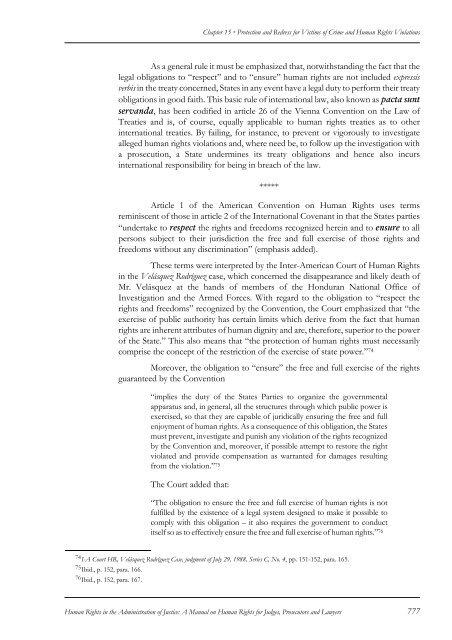protection and redress for victims of crime and human rights violations
protection and redress for victims of crime and human rights violations
protection and redress for victims of crime and human rights violations
You also want an ePaper? Increase the reach of your titles
YUMPU automatically turns print PDFs into web optimized ePapers that Google loves.
Chapter 15 • Protection <strong>and</strong> Redress <strong>for</strong> Victims <strong>of</strong> Crime <strong>and</strong> Human Rights ViolationsAs a general rule it must be emphasized that, notwithst<strong>and</strong>ing the fact that thelegal obligations to “respect” <strong>and</strong> to “ensure” <strong>human</strong> <strong>rights</strong> are not included expressisverbis in the treaty concerned, States in any event have a legal duty to per<strong>for</strong>m their treatyobligations in good faith. This basic rule <strong>of</strong> international law, also known as pacta suntserv<strong>and</strong>a, has been codified in article 26 <strong>of</strong> the Vienna Convention on the Law <strong>of</strong>Treaties <strong>and</strong> is, <strong>of</strong> course, equally applicable to <strong>human</strong> <strong>rights</strong> treaties as to otherinternational treaties. By failing, <strong>for</strong> instance, to prevent or vigorously to investigatealleged <strong>human</strong> <strong>rights</strong> <strong>violations</strong> <strong>and</strong>, where need be, to follow up the investigation witha prosecution, a State undermines its treaty obligations <strong>and</strong> hence also incursinternational responsibility <strong>for</strong> being in breach <strong>of</strong> the law.*****Article 1 <strong>of</strong> the American Convention on Human Rights uses termsreminiscent <strong>of</strong> those in article 2 <strong>of</strong> the International Covenant in that the States parties“undertake to respect the <strong>rights</strong> <strong>and</strong> freedoms recognized herein <strong>and</strong> to ensure to allpersons subject to their jurisdiction the free <strong>and</strong> full exercise <strong>of</strong> those <strong>rights</strong> <strong>and</strong>freedoms without any discrimination” (emphasis added).These terms were interpreted by the Inter-American Court <strong>of</strong> Human Rightsin the Velásquez Rodríguez case, which concerned the disappearance <strong>and</strong> likely death <strong>of</strong>Mr. Velásquez at the h<strong>and</strong>s <strong>of</strong> members <strong>of</strong> the Honduran National Office <strong>of</strong>Investigation <strong>and</strong> the Armed Forces. With regard to the obligation to “respect the<strong>rights</strong> <strong>and</strong> freedoms” recognized by the Convention, the Court emphasized that “theexercise <strong>of</strong> public authority has certain limits which derive from the fact that <strong>human</strong><strong>rights</strong> are inherent attributes <strong>of</strong> <strong>human</strong> dignity <strong>and</strong> are, there<strong>for</strong>e, superior to the power<strong>of</strong> the State.” This also means that “the <strong>protection</strong> <strong>of</strong> <strong>human</strong> <strong>rights</strong> must necessarilycomprise the concept <strong>of</strong> the restriction <strong>of</strong> the exercise <strong>of</strong> state power.” 74Moreover, the obligation to “ensure” the free <strong>and</strong> full exercise <strong>of</strong> the <strong>rights</strong>guaranteed by the Convention“implies the duty <strong>of</strong> the States Parties to organize the governmentalapparatus <strong>and</strong>, in general, all the structures through which public power isexercised, so that they are capable <strong>of</strong> juridically ensuring the free <strong>and</strong> fullenjoyment <strong>of</strong> <strong>human</strong> <strong>rights</strong>. As a consequence <strong>of</strong> this obligation, the Statesmust prevent, investigate <strong>and</strong> punish any violation <strong>of</strong> the <strong>rights</strong> recognizedby the Convention <strong>and</strong>, moreover, if possible attempt to restore the rightviolated <strong>and</strong> provide compensation as warranted <strong>for</strong> damages resultingfrom the violation.” 75The Court added that:“The obligation to ensure the free <strong>and</strong> full exercise <strong>of</strong> <strong>human</strong> <strong>rights</strong> is notfulfilled by the existence <strong>of</strong> a legal system designed to make it possible tocomply with this obligation – it also requires the government to conductitself so as to effectively ensure the free <strong>and</strong> full exercise <strong>of</strong> <strong>human</strong> <strong>rights</strong>.” 7674 I-A Court HR, Velásquez Rodríguez Case, judgment <strong>of</strong> July 29, 1988, Series C, No. 4, pp. 151-152, para. 165.75 Ibid., p. 152, para. 166.76 Ibid., p. 152, para. 167.Human Rights in the Administration <strong>of</strong> Justice: A Manual on Human Rights <strong>for</strong> Judges, Prosecutors <strong>and</strong> Lawyers 777
















